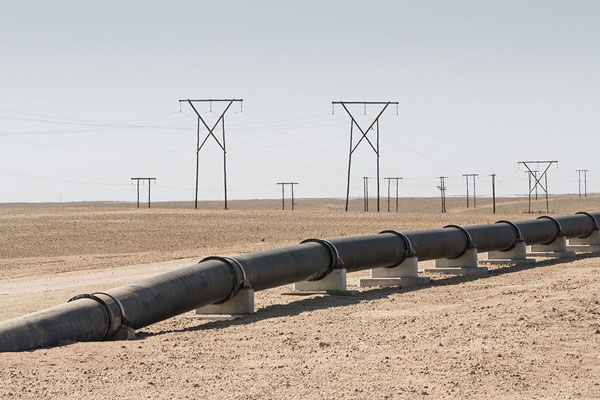Explainer: What Is the Iraq-Turkey Oil Pipeline Dispute and Who's on the Hook?
(Reuters) — An international arbitration ruling on March 23 prompted the shutdown of Iraq's northern crude oil exports through Turkey and sent oil prices back towards $80 a barrel.
Iraq, OPEC's second-largest oil producer, exports about 85% of its crude via ports in the south. But the northern route via Turkey still accounts for about 0.5% of global oil supply.
What Is the Origin of the Dispute?
Iraq's Kurdistan Regional Government (KRG) began exporting crude from the semi-autonomous northern region independently from the federal government in 2013, a move Baghdad deemed illegal.
KRG exports flow through a KRG pipeline to Fish-Khabur on the northern Iraqi border, where the oil enters Turkey and is pumped to the Turkish port of Ceyhan on the Mediterranean coast.
RELATED: Oil Firms Halt or Cut Output in Iraqi Kurdistan After Pipeline Closure
Iraq's federal government says its state-owned marketed SOMO is the only party authorized to manage crude exports through Ceyhan.
Iraq filed for arbitration in 2014 with the Paris-based International Chamber of Commerce (ICC) over Turkey's role in facilitating oil exports from Kurdistan without the consent of the federal government in Baghdad.
Iraq said that by transporting and storing oil from Kurdistan and loading it on tankers in Ceyhan without Baghdad's approval, Ankara and Turkish state energy company BOTAS violated provisions of an Iraq-Turkey pipeline agreement signed in 1973.
How Did the Case Develop?
After the final hearing in Paris in July, the ICC ruled on March 23 in Iraq's favour for the right to control loading at Ceyhan and to have access to see what was being loaded, a source familiar with the case has told Reuters.
Turkey was also asked to pay 50% of the discount at which KRG oil was sold, three sources said.
However, Turkey claimed the ICC overruled four out of Iraq's five demands and had ordered Iraq to pay compensation to Turkey, without stating the amount. Turkey also won a counter claim for Iraq to pay a pipeline throughput fee, one source said.
RELATED: Iraqi Kurdistan Region's Oil Output at Risk After Turkey Halts Pipeline Exports
Based on all the rulings, the net amount Turkey owes Iraq was about $1.5 billion before interest, the source familiar with the case said. According to a Turkish source, Iraq's initial demand was for about $33 billion.
The arbitration case covers the period 2014-2018.
A second arbitration case, which could take about two years, would cover the period from 2018 onwards.
The Turkish government and the governments in Baghdad and Kurdistan have released statements since the court ruling but none of them included full details about the decision.
The KRG declined to comment when asked for further details. The Turkish energy ministry did not immediately respond to requests for further comment. The Iraqi oil ministry could not immediately be reached on Friday, the Iraqi weekend.
Why Did Turkey Halt Oil Exports?
On March 25, Turkey stopped pumping around 450,000 barrels per day (bbl/d) of Iraqi oil via the pipeline to Ceyhan.
This comprised 370,000 bbl/d of KRG crude and 75,000 bbl/d of federal crude, a source familiar with pipeline operations said.
Turkey shutdown the pipeline because Iraq's federal government won the right to control loading at Ceyhan. Iraq's SOMO would have to instruct Turkey on ship-loading or the crude would have built up in storage with nowhere to go.
Turkey, Iraq's federal government and the KRG are in talks on how to reach a mutual agreement over northern Iraqi exports. A KRG source said Turkey had no choice but to halt flows through the pipeline until an agreement could be found.
How Have KRG Oil Sales Developed Since 2014?
Sales of KRG crude through the pipeline have grown rapidly over the past decade, with the total value reaching $12.3 billion in 2022, according to a Deloitte report, up 62% from 2017 when Deloitte first published data.
The KRG's ministry of natural resources said its oil revenues reached $5.9 billion in 2015.
From June 2015, the KRG restarted independent oil sales and signed several pre-payment deals with oil trading houses.
With its oil exports at a standstill, Kurdistan has halted repayments to energy traders including Vitol and Petraco on crude cargo deals worth $6 billion, trading sources said.
Vitol and Petraco have declined to comment on the issue.
Related News
Related News

- Enbridge Plans 86-Mile Pipeline Expansion, Bringing 850 Workers to Northern B.C.
- Intensity, Rainbow Energy to Build 344-Mile Gas Pipeline Across North Dakota
- U.S. Moves to Block Enterprise Products’ Exports to China Over Security Risk
- 208-Mile Mississippi-to-Alabama Gas Pipeline Moves Into FERC Review
- Court Ruling Allows MVP’s $500 Million Southgate Pipeline Extension to Proceed
- U.S. Pipeline Expansion to Add 99 Bcf/d, Mostly for LNG Export, Report Finds
- A Systematic Approach To Ensuring Pipeline Integrity
- LNG Canada Start-Up Fails to Lift Gas Prices Amid Supply Glut
- 275-Mile Texas-to-Oklahoma Gas Pipeline Enters Open Season
- TC Energy’s North Baja Pipeline Expansion Brings Mexico Closer to LNG Exports





Comments